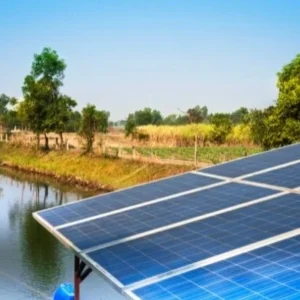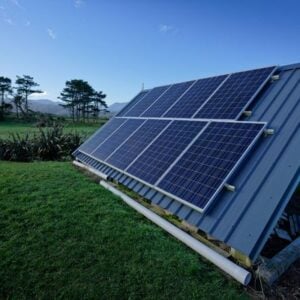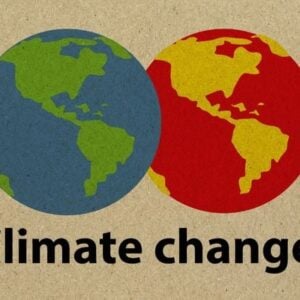On July 2, 2025, BudgIT Foundation, through its Natural Resources and Climate Governance team and with support from Publish What You Pay (PWYP) Nigeria, hosted a high-level roundtable in Abuja on promoting renewable energy adoption. The event brought together government representatives, private sector actors, civil society, and academia to discuss strategies for scaling renewable energy nationwide. It created a platform to reflect on challenges, share opportunities, and propose actionable solutions for Nigeria’s clean energy transition.
In his opening remarks, Gabriel Okeowo, BudgIT’s Country Director, stressed the urgency of accelerating renewable energy adoption. With over 85 million Nigerians currently lacking electricity—a number projected to rise to 120 million by 2030 due to population growth outpacing electrification—he called for decisive action. Enebi Opaluwa, Head of Natural Resource and Climate Governance at BudgIT, noted that policy fragmentation remains a key obstacle and urged harmonised frameworks to guide both government and private sector efforts.
BudgIT’s Research Analyst, Alice Adedayo, gave an overview of Nigeria’s energy landscape, highlighting that while demand stands at 31.2 terawatt-hours, 40% of the population still has no access to electricity. She observed that Nigeria’s energy mix remains dominated by gas-fired power, though hydropower is the leading renewable source and solar is expanding in rural and off-grid areas. She projected that if national plans are implemented, renewables could provide up to 60% of demand by 2050. She pointed to financing gaps, policy inconsistencies, high import tariffs, and limited technical skills as major barriers, recommending stronger infrastructure, accessible financing, and greater public-private collaboration.
From the government side, Myzammil Waziri, representing the Managing Director of the Rural Electrification Agency (REA), spoke on accelerating rural electrification through decentralised solutions. He noted that 24% of Nigerians live in 700,000 unelectrified communities and outlined REA’s three strategies: grid extensions, community-level solar and battery mini-grids, and solar home systems for dispersed settlements. He highlighted achievements such as 7.8 million people already benefiting from clean energy, over 1.1 million connections, and 11,400 MSMEs impacted.
From civil society, Dr. Erisa Danladi, National Coordinator of PWYP, underscored the importance of inclusive energy access, citing how electricity shortages disrupt livelihoods, particularly for women and entrepreneurs. Her intervention reinforced the need for multi-stakeholder dialogue to ensure equity in renewable energy expansion.
The discussions explored diverse technologies—solar, wind, small hydropower, bioenergy, and waste-to-energy—emphasising decentralised, community-driven solutions. Examples included mini-grids powering schools and productive activities in agriculture. Financing models such as performance-based grants, solarisation initiatives for public institutions, and private sector-led distributed energy programmes were also presented. REA has already deployed 94 MW of solar PV capacity and disbursed $400 million in grants, with an additional $900 million in the pipeline.
Participants, however, highlighted ongoing challenges. Policy inconsistency and slow coordination were identified as major barriers to investment. Rural communities often lack the capital to afford renewable systems, even as urban households increasingly adopt solar due to unreliable grid supply. Environmental concerns around battery storage and recycling were also raised, with calls for stricter regulation and local recycling infrastructure. Untapped renewable sources such as geothermal and biomass were discussed as areas requiring further research and investment.
A recurring theme was the importance of community-focused projects tailored to local realities. Stakeholders emphasised the need to prioritise women, small businesses, and rural populations in the energy transition. Collaboration with subnational governments and local communities was seen as vital to ensure a just and inclusive process. The Ministry of Environment also highlighted its bottom-up approach through grassroots programmes such as clean cooking initiatives.
The roundtable concluded with a call for stronger partnerships, consistent policies, and investment in domestic renewable technology production. Recommendations included encouraging local manufacturing of solar panels and batteries, leveraging Nigeria’s mineral resources, expanding subsidies and financing for rural communities, and strengthening cross-agency collaboration. Participants stressed that renewable energy has the potential to close Nigeria’s electricity access gap while driving economic growth, improving livelihoods, and advancing climate goals.
The dialogue produced several key outputs, including clarity on financing models for off-grid projects, improved guidance for private sector participation, strategies to overcome equipment import bottlenecks, and greater opportunities for collaboration across government, civil society, and private actors. It also identified unconventional sources such as bio-waste as new frontiers for renewable development. Overall, the Abuja roundtable reinforced that Nigeria’s path to energy transition must be inclusive, collaborative, and responsive to community needs to achieve long-term sustainability.







